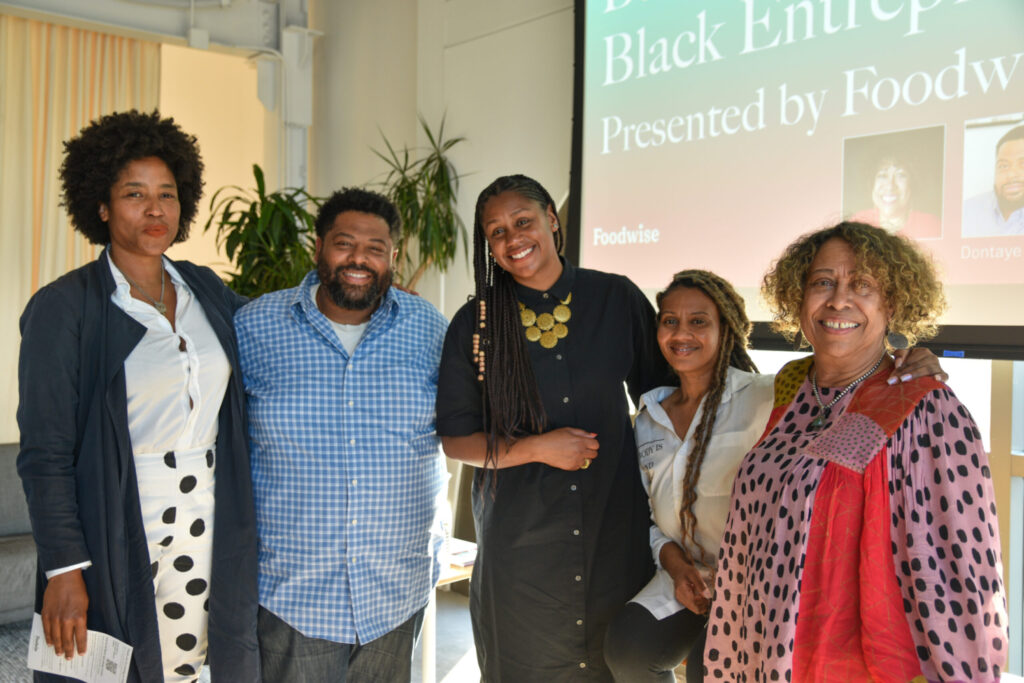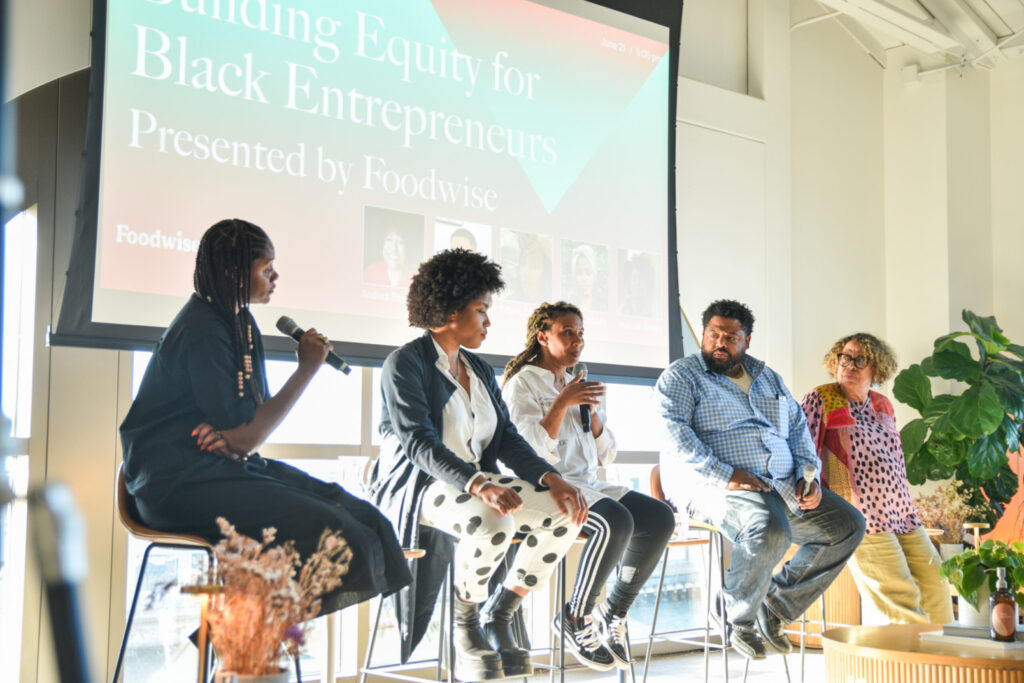Black Entrepreneurs Share 8 Strategies to Build Equity
Selina Knowles, Communications Coordinator
July 7, 2023

Black food entrepreneurs and organizers are leading the development of innovative, community-based models to uplift Black, Indigenous, and People of Color (BIPOC) food culture and traditions and build wealth, health, and power in Bay Area communities. As part of the Building Equity Program, Foodwise has been working with several of these organizations to expand farmers market opportunities for BIPOC businesses, as well as open conversations about our shared visions for an equitable future.
BIPOC-owned businesses continue to face systemic barriers to accessing capital and developing a thriving business, which require policy change, collaborative strategies, and community efforts. At a Foodwise Talk called “Building Equity for Black Entrepreneurs” on June 21, 2023, Building Equity community partners and Black food entrepreneurs who have participated in Foodwise farmers markets shared stories as well as specific actions all of us can take to invest in Black businesses and build a more equitable Bay Area. Here are a few key takeaways, and you can listen to the full talk here.

Recognize your role in building equity. Change requires collective action. “We all have a part in this and a lot of people feel like they don’t,” says Chef Tiffany Carter. Tiffany is the co-founder of SF Black Wallstreet, a nonprofit working toward economic development and spatial justice for Black San Franciscans. She also founded Boug Cali, a California Soul bodega found in the La Cocina Municipal Marketplace and at the Chase Center.
Shop at local Black-owned businesses. “Equity, to me, looks like a line item in your budget,” says Tiffany, “Just be very intentional with where you spend. When I’m hungry, I’m like, ‘Who am I giving my money to?’ Think about that.” When it’s time to decide where to get dinner, consider bringing your dollars to a Black-owned business.
Build a habit of working with Black businesses. Seek out Black businesses in your community and make them part of your regular vendor list. It’s one thing to spotlight Black-owned businesses during Black History Month in February and in June leading up to Juneteenth, but business owners are often inundated these two times of the year, when they need steady business year-round.
As the Executive Director of En2Action, Andrea Baker works with Black business owners to develop or strengthen their businesses, and she knows the value of consistent customers. “I want to encourage you to not just think about Black operators on the two holidays of the year,” she says. “I want you to think about it like it’s a muscle that you haven’t used. And in order for that muscle to get strong, you got to start using it now, and you got to use it regularly.”
Leverage your (social) capital. White-owned businesses are 2-3 times more likely to receive all their financing, compared to Black-owned businesses, which makes relationships all the more important to the success of Black businesses. Shakirah Simley, the Executive Director at Booker T. Washington Community Center, asks the question, “How can you leverage those relationships or how can you leverage your purchasing power to support another Black or BIPOC business?”
Andrea suggests asking your employer, “Do we have any Black people on our procurement list?” Chef Dontaye Ball shares the example of when his business Gumbo Social accepted a catering opportunity, on the condition that he could bring another Black chef and entrepreneur with him.
Be respectful of Black culture and spaces. Show up with respect. “When I go to another community, I’m in that community and I’m letting them do their thing,” says Dontaye. “I don’t challenge them on what it may look like or how someone’s dressing or the language is being used. I go there, I eat my food, I enjoy the culture, I ask some questions, spend my money, and I go home.”
Bring something to the table. Small business owners juggle many hats to meet the demands of a changing economy, such as keeping up with social media or online shops, or even building a financially sound foundation. Sabine Dabady, MPH, the Entrepreneurship Development Manager of Mandela Partners, works with entrepreneurs who are formalizing their businesses. They say, “If you have expertise, if you’re a bookkeeper, if you’re a CPA, if you have legal expertise, if you like taking photos, if you like to market, if you know how to website-build—all entrepreneurs need this stuff to build their capacity.”
Spread the word and amplify the work of Black creators. Help get the word out about businesses and products that you benefit from. “When you have a great experience with a Black operator, talk about it,” says Andrea. “Spread the word and allow other people to discover just how good we are, and actively engage your contacts for referrals.”
Invest in and advocate for holistic support. “I think a lot of what you don’t see is the invisible networks and effort that help people to even run businesses,” says Sabine, such as childcare, transportation, housing, and liability coverage. Shakirah says that equity is “not just going to be off of the backs of individual business owners and really incredible nonprofit leaders. We need to invest in our public social safety net to make sure that we right the wrongs of past harms to Black people.” She calls us in to engage in civic action on a local, state, and national level to push policy makers to make decisions that reflect equitable values.
Listen to a recording of the full talk here or watch here.
Topics: Building Equity program, Entrepreneurship, Equity, Events, Talks
